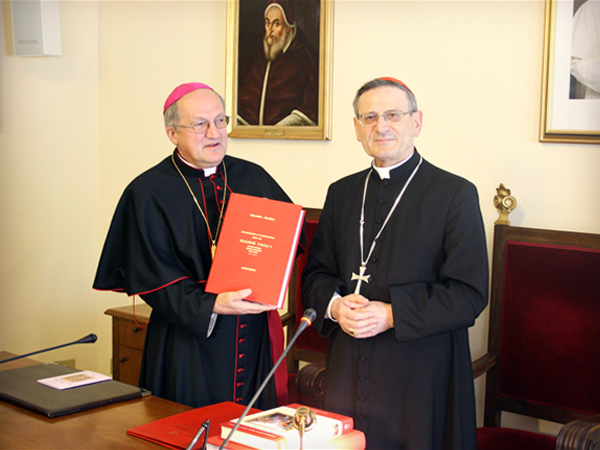Evaluation in Rome
The Congregation for the Causes of Saints shall evaluate all the received material in various internal forums through a procedure made up of four phases like the diocesan process. During the evaluation, the Congregation shall also ask for or carry out new examinations if needed.

In all canonization processes, the primary aim is to find out about the entire truth so that the Pope as supreme judge, based on the opinion submitted by the Congregation, can make a well-founded decision about the holiness or martyrdom, the required miracles and the beatification or canonization of the candidate.
1. Preliminary phase: tasks related to the reception of the acts and to the formal examination of the diocesan process
The promoter of the cause as Petitioner is unchanged but he has to appoint a new, Roman Postulator who is resident in the Eternal City and is available for consultation with the Congregation at any time. He has to request the reception of the material of the inquiry and the official opening of the sealed acts of the diocesan process. Following the formal examination of the material (and the resolution of eventual discrepancies), the ordinary congress of the Congregation shall declare the lawfulness of the diocesan inquiry in a separate decree.
2. Examination of the content (completion) of the acts and preparation of the summary of the documentation of the cause (the so-called Positio or Position)
In Rome, the Relator is responsible for coordinating the work of historical experts and for ensuring that the Position, that is, the summary of the material of the diocesan inquiry prepared in Rome, contains everything that is essential for the well-founded evaluation and decision-making by the Congregation. The term Position comes from the fact that, due to its small measures, it can be positioned on top of a desk unlike the acts, which amount to hundreds or thousands of pages and can only be stored and managed in larger boxes.

3. Evaluation of the documentation (decisions by the Historical Consultors, Theologians and the Congregation)
In all the ancient causes and in all the recent causes for which the Congregation regards it as necessary, the Position is first evaluated by the commission of Historical Consultors, who then attach their written expert opinion to the documentation.

Afterwards, at the so-called extraordinary congress, eight Theologians bring a decision requiring qualified majority on the merit of the reputation of holiness or martyrdom and on the provable heroic virtues or martyrdom of the candidate. These are the two main points of all processes of canonization. The Theological Consultors also give the reasons on which their decision is based in a written and detailed form so that the Promoter of the Faith (previously called the "Devil's advocate") can submit a detailed expert material to the ordinary congress of the Cardinals and Bishops of the Congregation. Before the ordinary congress, the Cardinal Prefect appoints a Cardinal as Relator of the cause, and the rest of the Bishops and Cardinals of the Congregation express their opinion by their votes. At the congress, the Congregation prepares its final expert opinion to be submitted to the Pope.
4. Decisions of the Pope
The Cardinal Prefect of the Congregation presents the examined causes to the Holy Father: the holiness or martyrdom of the Servant of God and the miracle attributed to the intercession of the Venerable Servant of God or the Blessed. The Prefect brings to the private audience a so-called letter of audience, which provides the Holy Father with a short summary of the entire process. This carefully prepared petition consists of the following parts:

1. the most relevant data and circumstances of the life and deeds of the Servant of God or his death as a martyr;
2. a short summarizing report of each of the phases of the process;
3. the Cardinal Prefect's official petition to the Pope to accept the expert opinion of the ordinary congress of the Congregation and to order the publication of the Congregation's decree proclaiming the Pope's positive decision.
In causes of martyrs no miracle is required for the beatification while in causes of confessors of the faith the examination of the alleged miracle may begin when the Pope has recognized the candidate's holiness. The miracle may not be examined before the first papal decision is made. The beatification of confessors of the faith may take place after the examination of the miracle and its recognition by the Pope.

The traditional pontifical formula of beatification is as follows:
Acceding to the request of our Brother N, of many other of our Brothers in the episcopate, and many of the faithful, after consultation with the Congregation for the Causes of Saints, by our apostolic authority we declare that the Venerable Servant of God N, shall henceforth be invoked as Blessed and that his feast shall be celebrated every year on the (date), in the places and according to the norms established by Church law. In the name of the Father, and of the Son, and of the Holy Spirit.
Amen.
The candidate's holiness or martyrdom is examined by the Congregation exclusively before the beatification, not before the canonization. After the beatification of both martyrs and confessors of the faith, their canonization requires one recognized miracle and the fullness of the veneration for the Blessed.

The traditional pontifical formula of canonization is as follows:
For the honour of the Blessed Trinity, the exaltation of the Catholic faith and the increase of the Christian life, by the authority of our Lord Jesus Christ, and of the Holy Apostles Peter and Paul, and our own, after due deliberation and frequent prayer for divine assistance, and having sought the counsel of many of our brother Bishops, we declare and define Blessed N to be Saint and we enroll him/her among the Saints, decreeing that he/she is to be venerated as such by the whole Church. In the name of the Father, and of the Son, and of the Holy Spirit.
Amen.


